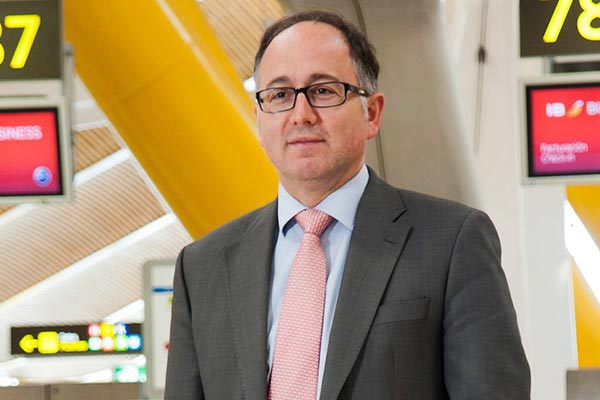
Luis Gallego
President of Iberia
“We all need to be rowing in the same direction, something that we haven’t done up to now”
Does Iberia still consider itself a Spanish company?
A company with the name Iberia, with some sixteen thousand Spanish employees, operating since 1927 with flights that always depart or arrive in Madrid, proud to bear the colors of the Spanish flag… That’s a Spanish company indeed, whose focus is on the Spanish territory. Today, any company may have international shareholders, which is the case of Iberia right no.
Where are the new markets? Do we need to globalize more and move beyond Latin America?
Yes. We are leaders in Latin America and we want that to continue. We are strengthening our position, but we also want to develop Iberia outside of this main market. We already fly to ten destinations in Africa. We think that Spain has a really good geographical location as a hub for channeling traffic to Africa. There are also good business opportunities in Asia, which is a market that will see strong development in the future. The flow of traffic between Asia and Latin American is expected to be one of the most important in coming years.
Is the European sector becoming consolidated?
When you look at the consolidation that has taken place in the United States, you can see that it has been much greater than that we have seen here. Right now there are too many airlines, and the majority are suffering. Those that have not undergone a transformation like we have are currently immersed in that process, while some others have fallen by the wayside. So consolidation is the future, whether we like it or not.
Do we need to employ a much more advanced tourism strategy?
We need a tourism strategy. We have always focused on sun and sand, which is very seasonal, but there are other types of tourism such as shopping, spa, health, nature, and so on, which we have to strengthen because they offer a greater average income. In Spain, we have often fallen into the trap of not working together. But in Madrid, for example, there are now six public-private enterprises that form part of the Tourism Association, working together to develop the city as a tourist destination and generally promote a policy that gets everyone rowing in the same direction, something that we haven’t done up to no.
Do people choose their flights based on prices? Is that the essential factor?
Medium- and long-haul flights have become a commodity, and in that segment people mainly go on price. In the case of short-haul flights (less than two hours), people tend to get on Google, which gives them a price listing. When deciding between airlines that you know have no safety problems, your choice is often based on the price. It is true that we don’t only operate direct flights but also a lot of connecting flights. In the case of this kind of travel, what people are looking for is an experience, in particular in the case of long-haul. Onboard service is totally different in this segment, and that is what makes the difference.
Who are your main competitors in Spain?
It is difficult to have a network of short- and medium haul flights that competes with the AVE network of high-speed trains, and they are one of our competitors. In general, in the sphere of long-haul, the European hubs fight to attract connecting flight passengers who, in the end, don’t care whether they pass through Charles de Gaulle, Frankfurt, or Madrid. The only thing they want is to find the most competitive deal.
